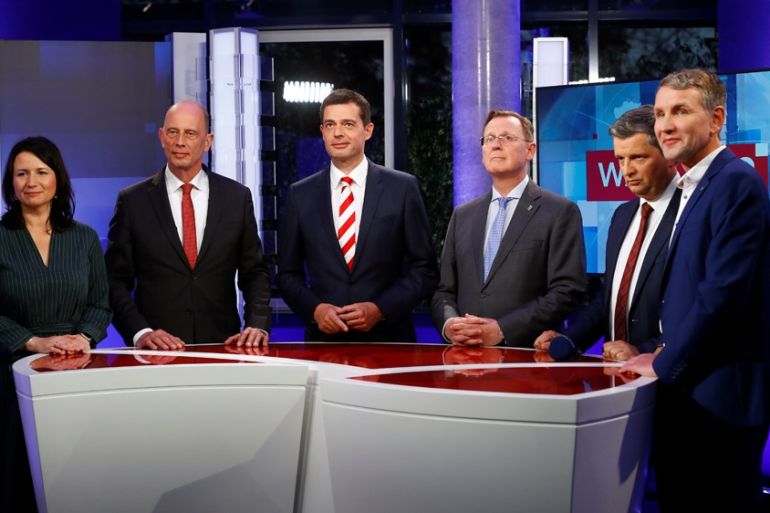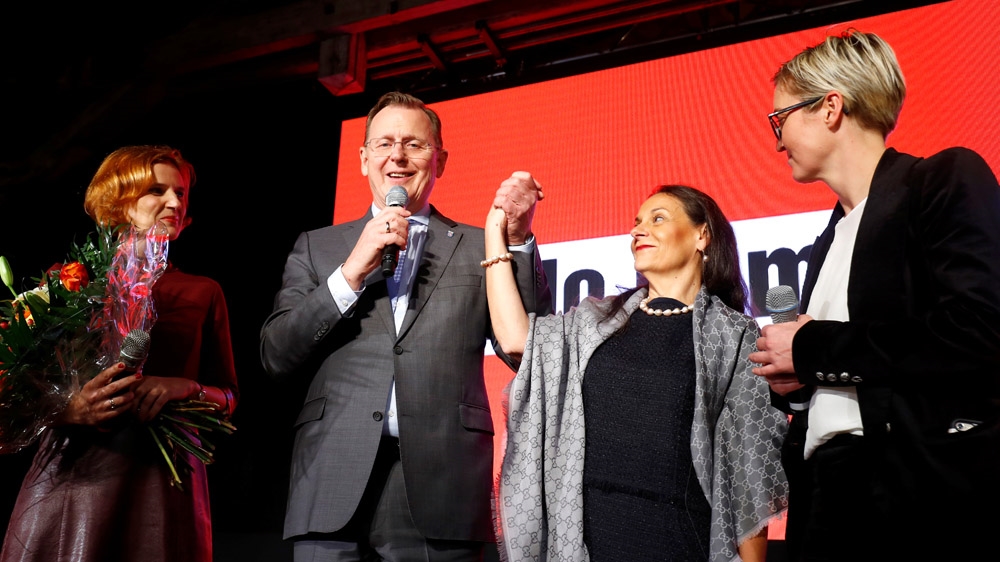Germany’s far-right AfD makes gains in Thuringia state elections
The AfD overtook Chancellor Angela Merkel’s Christian Democratic Union, finishing behind socialist Linke in state polls.

Berlin, Germany – Alternative for Germany (AfD) party more than doubled its share of the vote but failed to become the largest party in the German state of Thuringia, in an election widely seen as a bellwether of the far-right party’s growing strength in its eastern heartlands.
The AfD overtook Chancellor Angela Merkel‘s slumping Christian Democratic Union (CDU) to receive 24 percent of the vote, according to exit polls by public broadcaster ARD, finishing behind socialist Linke on 30 percent, which made history by becoming the first left-wing party to win a state election in reunified Germany.
Keep reading
list of 3 itemsGermany’s far-right AfD party ‘tearing itself apart’
Germany: No lessons learnt from history
Thuringia, a small state in former East Germany, became the centre of national attention as the AfD sought to build on recent electoral gains, finishing in second place in both Saxony and Brandenburg in September.
Merkel, who has faced criticism for allowing a record number of immigrants in the wake of 2015 refugee crisis, has announced that she would not run for chancellor in the next federal elections scheduled to be held in 2021. Her successor Annegret Kramp-Karrenbauer has so far struggled to check the CDU’s declining popularity.
The campaign focused on issues of transport, education and healthcare – all key concerns in the east, where rural depopulation and economic stagnation have led to bitterness among residents who feel left behind by the more prosperous west. East and West Germany were reunited in 1990.
Riding the wave of discontent in Thuringia was the ascendant leader of the AfD in Thuringen, Bjorn Hocke, one of the most extreme figures in German politics, a firebrand whose unashamedly anti-immigrant rhetoric veers so close to Germany’s former Nazi leaders that even some within his own party find him unnerving.
“This is a clear sign from the people of Thuringia that things will not continue like this,” said Hocke, calling the result a “small, party-political revolution,” and promising supporters an absolute majority in the next election.
“I understand that there is a clear electoral mandate [for the governing coalition] and that I can continue my work quickly as head of government through appointment by the Thuringian state parliament,” said trade unionist leader of Linke Bodo Ramelow, who granted that the AfD’s increased influence would make forming a government difficult.
The continued support of the centre-left Social Democratic Party and the Greens will no longer be enough to govern, and CDU General Secretary Paul Ziemiak immediately reiterated his party’s refusal to assist the left. But all parties have unequivocally ruled out working with the AfD.
“I think Hocke is a Nazi … We will not work with them,” Mike Mohring, the CDU’s leader in Thuringia, told a town hall meeting in Erfurt earlier this week.
Mohring, like several other candidates, said he received numerous death threats from suspected Neo-Nazi supporters during his campaign, including one signed off with “Heil Hitler”.
Hocke, who has survived two attempts to remove him from the party, has previously described Berlin’s Holocaust memorial as a “monument of shame” and argued that Germany has been too apologetic for its dark history.
The former history teacher has built an extreme fraction within the AfD called “The Wing”, whose leadership has been placed under observation by Germany’s domestic intelligence agency as a potential danger to democracy in the country.
“When confronted with quotes from his latest book, other leading members famously could not say whether they had been written by Hocke or Hitler. The rhetoric is very, very similar,” Kai Arzheimer, professor of political science at the University of Mainz, told Al Jazeera.
“The party as a whole has become ever more radical over the last four years. Both party leaders, Alexander Gauland and Jorg Meuthen, have repeatedly attended and addressed gatherings of The Wing and are publicly courting far-right intellectuals like [extremist publisher and activist] Gotz Kubitschek.”

Dark mood
The dark mood surrounding the vote deepened two weeks ago when a far-right gunman opened fire outside a synagogue in Halle, in the neighbouring state of Saxony-Anhalt, killing two people on the Jewish holiday of Yom Kippur.
Hocke condemned the attack, but his party dipped in the polls as political opponents and civil society groups accused him of fanning the flames of hatred in Germany, where anti-Semitic offences jumped by 20 percent last year.
Arndt Leininger, a political scientist at Freie Universitat Berlin, believes the result was in line with the 23 percent AfD received from Thuringia residents in the 2017 federal election, but that its disruption to the balance of power means other parties will have to find a compromise to form a functional government in Thuringia.
“The CDU might have to reconsider [their refusal to work with the left] because coalitions excluding either Linke or the CDU are very unlikely,” he said.
“Germany does have some experience with [minority government] on the state level so that option is also on the table.”